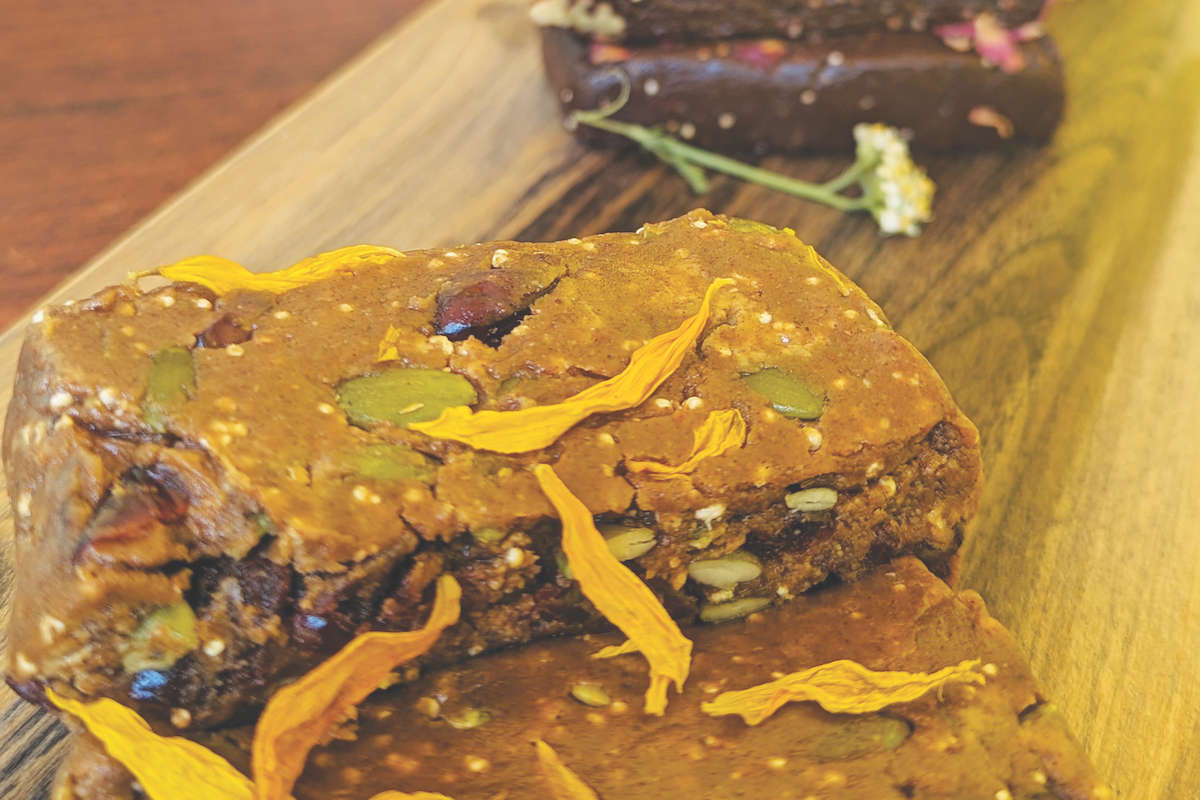There is a new snack in the Town. Indigenous restaurant and cultural hub Wahpepah’s Kitchen, in Fruitvale, now offers protein-packed Indigenous Bars, bringing the wisdom of native ingredients to the high-octane requirements of busy contemporary lifestyles.
Handmade by Rikki Hopper, 25, daughter of owner-activist Crystal Wahpepah, the bars are a step into the larger world of cultural power for the region’s Indigenous communities. For Hopper, hand-building orders with her team in a dedicated space in the kitchen before packaging them into boxes of three allows for precious connections to the community and other Indigenous growers.
Food nourishes, a little detail almost forgotten in the mass-produced Happy Meal era which, although still with us, is at least under scrutiny from medical and health experts. Often overlooked is the fact that in addition to bodies, food also nourishes communities.
“Absolutely, a lot of love is put into it,” Hopper said. “I can’t wait to see how happy people are when they get them.” The bars are ordered in small packages of three or in bulk, often for Native ceremonies where they may be delivered by Hopper herself.
The natural ingredients in the bars are carefully sourced from Native producers with the goal of creating a food that cares for the bodies of customers and provides income for the growers.
Wahpepah makes it a point to include her three daughters in the process, starting at a young age, so as to help them understand the importance of sourcing ingredients and maintaining relationships throughout the land across generations.
“The farm who makes our maple was struggling,” Hopper said, “[and we were] able to help each other throughout that process. Collaborating is very important.”
Now about those bars: A bit more brownie-like than supermarket protein bars, but with a similar density, the bars offer a natural spectrum of color between the different flavors, offering visual clues as to the authenticity of the ingredients. The ingredients, including whole seeds and garnishes such as edible flowers, are visible.
On the day I visited Wahpepah’s Kitchen, I tasted three different varieties of Indigenous Bars. A healthy flight was laid out before me, starting from the lightest in flavor, maple, to the darkest, choke cherry. In between lay chocolate rose hip. Each bar was delicious in its own way, but to my surprise the choke cherry proved to be my favorite. After tasting the maple I did not think the others could surpass it.
The taste was as luxurious as the food was nourishing. The locally made, energy-dense bars seem as nutritionally relevant to today’s East Bay population, with its modern stresses, as they were to prior generations who lived here in pre-colonial times.
Hopper takes this lesson to heart. Providing traditional nourishment for the larger community is an expression of her pride in the Kickapoo and Sac and Fox Tribes of Oklahoma, as well as our own regional Big Valley Pomo. Wherever tribes exist throughout North America, they continue to struggle against the ongoing erasure of the people who have lived with the land for millennia.
The Europeans who perpetuated and followed colonization once believed Turtle Island—as North America is known among the Indigenous peoples of the continent—to be a virgin territory left fallow by uncivilized natives, completely missing the degree of stewardship Indigenous people engaged in when living in relationship with the land.
But consciousness is rising around issues of stewardship, as illustrated by Native American Deb Haaland’s appointment to the office of Secretary of the U.S. Department of the Interior and the movement to consult Indigenous practices in fire-safe management of California’s forests.
A young dynamo who spends her days hand-making these bars derived from the traditional foods of her peoples, Hopper is ready to take on the world as a law student studying tribal law.
Less than 1% of students in law school and 0.5% of lawyers in the nation are of Native American descent according to the American Bar Association.
“I wanted to be a paralegal originally,” Hopper said, “but being here exposed me to a lot. Especially with my own tribe, things need to be worked on with the government and the tribal governments in general. There’s not a lot of us that could represent.”
She continued, “I’m all for my community. When our elders are gone, we’re the new generation coming up. I’m going to get to the front line to help my community.”
“Not every day do you get to taste something with love,” Wahpepah said. “My daughter, she’s actually really taking it and embracing it. At the same time, it’s about me teaching them, ‘OK, this is what we’re about, this is how we source, this is how we communicate with our food producers.’”
Hopper cherishes the time she spends with her mother.
“I learned a lot from my mom,” she said. “[Even in] law school I still teach others about place and foods, like what they can put in their bodies, all the benefits. You know, a classmate had chest pains. That’s what corn silk does, help with chest pains, so I was like, ‘Can I bring you corn silk tea from the restaurant?’”
She added, “Tribal law is my field, but I’m always [at the restaurant] outside of school. It’s a passion. This is my life.”
Wahpepah’s Kitchen, 3301 E. 12th St. Suite #133, Oakland. Order online at wahpepahskitchen.com/new-products.











